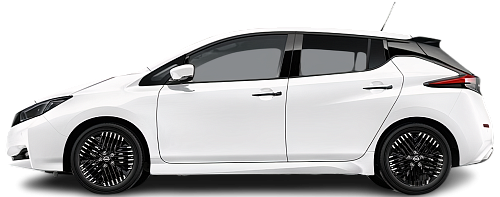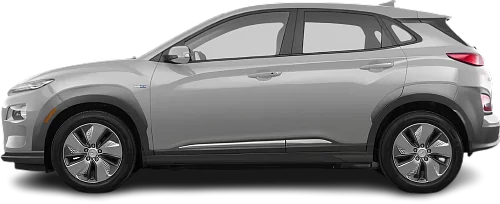USA EV Comparison: Nissan Leaf 40 kWh vs Hyundai Kona Electric Long Range
Struggling to Decide? Let AI Help!
Your AI Summary Is Ready!
General Info
Since both vehicles have been discontinued, they are now only available on the used car market. You can get the Nissan Leaf 40 kWh (2022-2025) for as low as $9999, while the Hyundai Kona Electric Long Range (2018-2019) was never offered for sale in the United States.
The Nissan Leaf 40 kWh (2022-2025) is a Hatchback, whereas the Hyundai Kona Electric Long Range (2018-2019) is a SUV.
| Property | Nissan Leaf 40 kWh | Hyundai Kona Electric Long Range |
|---|---|---|
| Years of Production | 2022-2025 | 2018-2019 |
| Current Status | Discontinued | Discontinued |
| Country of Manufacture | Japan, UK, USA | Czech Republic, India, South Korea |
| Body Style | Hatchback | SUV |
| Market Availability | EU, USA | EU |
| Price USA (Used) | $9999 | - Price USA (Used) |
| GCC Score | 4.8 | 5.7 |
Range and Efficiency
While the Hyundai Kona Electric Long Range (2018-2019) offers a longer real-world range and a bigger battery, it is less energy-efficient than the Nissan Leaf 40 kWh (2022-2025).
| Property | Nissan Leaf 40 kWh | Hyundai Kona Electric Long Range |
|---|---|---|
| Range (EPA) | 149 mi | - Range (EPA) |
| Range (WLTP) | 177 mi | 279 mi |
| Range (GCC) | 148 mi | 237 mi |
| Battery Capacity (Nominal) | 40 kWh | 67.5 kWh |
| Battery Capacity (Usable) | 39 kWh | 64 kWh |
| Efficiency per 100 mi | 26.4 kWh/100 mi | 27 kWh/100 mi |
| Efficiency per kWh | 3.79 mi/kWh | 3.7 mi/kWh |
| Range and Efficiency Score | 5.5 | 6.9 |
Charging
Both vehicles utilize a standard 400-volt architecture.
The Hyundai Kona Electric Long Range (2018-2019) offers faster charging speeds at DC stations, reaching up to 77 kW, while the Nissan Leaf 40 kWh (2022-2025) maxes out at 50 kW.
The Hyundai Kona Electric Long Range (2018-2019) features a more powerful on-board charger, supporting a maximum AC charging power of 7.2 kW, whereas the Nissan Leaf 40 kWh (2022-2025) is limited to 6.6 kW.
| Property | Nissan Leaf 40 kWh | Hyundai Kona Electric Long Range |
|---|---|---|
| Max Charging Power (AC) | 6.6 kW | 7.2 kW |
| Max Charging Power (DC) | 50 kW | 77 kW |
| Architecture | 400 V | 400 V |
| Charge Port | CHAdeMO | CCS Type 2 |
| Charging Score | 3.3 | 4.5 |
Performance
Both vehicles are front-wheel drive.
The Hyundai Kona Electric Long Range (2018-2019) boasts greater motor power and accelerates faster from 0 to 60 mph.
| Property | Nissan Leaf 40 kWh | Hyundai Kona Electric Long Range |
|---|---|---|
| Drive Type | FWD | FWD |
| Motor Type | PMSM | PMSM |
| Motor Power (kW) | 110 kW | 150 kW |
| Motor Power (hp) | 148 hp | 201 hp |
| Motor Torque | 236 lb-ft | 291 lb-ft |
| 0-60 mph | 7.7 s | 7.3 s |
| Top Speed | 90 mph | 104 mph |
| Performance Score | 3.1 | 3.8 |
Dimensions
The Nissan Leaf 40 kWh (2022-2025) has a longer body, while the Hyundai Kona Electric Long Range (2018-2019) stands taller, offering a more elevated ride. Their widths are almost identical, so both offer a similar amount of shoulder room.
The Nissan Leaf 40 kWh (2022-2025) boasts a more extended wheelbase.
| Property | Nissan Leaf 40 kWh | Hyundai Kona Electric Long Range |
|---|---|---|
| Length | 176.4 in | 164.6 in |
| Width (with Mirrors) | 79.9 in | 81.5 in |
| Width (w/o Mirrors) | 70.5 in | 70.9 in |
| Height | 61.5 in | 61.8 in |
| Wheelbase | 106.3 in | 102.4 in |
Cargo and Towing
The Nissan Leaf 40 kWh (2022-2025) features a larger trunk, but the Hyundai Kona Electric Long Range (2018-2019) offers greater maximum cargo capacity when the rear seats are folded.
Neither car is equipped with a frunk (front trunk).
Neither vehicle is officially rated for towing in the US.
| Property | Nissan Leaf 40 kWh | Hyundai Kona Electric Long Range |
|---|---|---|
| Number of Seats | 5 | 5 |
| Curb Weight | 3509 lb | 3715 lb |
| Cargo Volume (Trunk) | 23.6 ft3 | 19.2 ft3 |
| Cargo Volume (Max) | 30 ft3 | 45.8 ft3 |
| Cargo Volume (Frunk) | - Cargo Volume (Frunk) | - Cargo Volume (Frunk) |
| Towing Capacity | - Towing Capacity | - Towing Capacity |
| Cargo and Towing Score | 4.5 | 5.3 |




